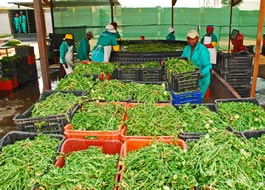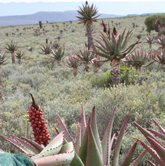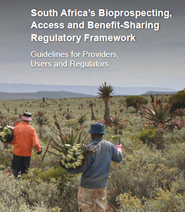The Access and Benefit-Sharing (BABS) Clearing House of the Republic of South Africa
Introduction and background
The National Department of Environmental Affairs (DEA) acts as the clearing house and national focal point, for ABS in South Africa. The Department further administers the relevant legislative tools that are aimed at ensuring sustainable utilization of indigenous genetic and biological resources and promoting the fair and equitable sharing of benefits and also balances the rights of those that own indigenous biological resources and the associated traditional knowledge with those that access these resources for commercial or industrial use.South Africa is actively engaged in bioprospecting activities which involve the exploration of biodiversity for commercial valuable genetic resources and biochemicals. This is largely due to the countries’ extraordinary rich and unique biodiversity and a well-developed research and institutional capacity, which provides an extremely favourable environment for bioprospecting, as well as other approaches based on trading and using the indigenous genetic and biological resources for commercial gain.. In South Africa, traditional practitioners are being approached by scientists to gain validity of the specialized knowledge which usually originates in communities close to where materials originate.
South Africa’s indigenous biological resources
South Africa is rich in biodiversity, ranked third after Brazil and Indonesia. Biodiversity is the term used to describe life on earth - the variety of living things, the places they inhabit and the interactions between them. South Africa is home to approximately 24 000 plants species and contains an entire floral kingdom, the Cape flora, within its borders. South African indigenous biological resources include any living or dead plant, animal or any other organism that occurs, or has occurred, naturally in a free state in nature within the borders of the Republic of South Africa. It includes any derivative and the genetic material of such plants, animals or organisms.
Legislative framework
outh Africa’s Bioprospecting, Access and Benefit-Sharing Regulatory Framework: Guidelines for Providers, Users and Regulators
The guidelines endeavour to assist different stakeholders to understand the legal requirements and their rights in terms of the law. It is therefore imperative that these guidelines are consulted when planning to engage in commercial bioprospecting. Doing so will enhance the fair and equitable sharing of benefits arising from bioprospecting projects which utilize indigenous biological resources and their associated traditional knowledge.
Nagoya Protocol On Access To Genetic Resources And The Fair And Equitable Sharing Of Benefits Arising From Their Utilization To The Convention On Biological Diversity
The Nagoya Protocol on Access to Genetic Resources and the Fair and Equitable Sharing of Benefits Arising from their Utilization (in short referred to as Nagoya Protocol on ABS) was adopted by the Conference of the Parties to the Convention on Biological Diversity at its tenth meeting on 29 October 2010 in Nagoya, Japan. The Nagoya Protocol on ABS entered into force of 12 October 2014.
South Africa became a signatory of the Nagoya Protocol on ABS on 11 May 2011 and ratified on 10 January 2013. The objective of the Nagoya Protocol is the fair and equitable sharing of benefits arising from the utilization of genetic resources including by appropriate access to genetic resources and by appropriate transfer of relevant technologies, taking into account all rights over those resources and to technologies and by appropriate funding, therefore contributing to the conservation of biological diversity and the sustainable use of its components.
The National Environmental Management: Biodiversity Act, 10 of 2004 (NEMBA)
Chapter 6 of the National Environmental Management: Biodiversity Act (Act no. 10 of 2004) regulates the exploration of biodiversity for commercially valuable indigenous genetic and biological resources and it came into force on 1 January 2006.
The legislation protects the interests of certain stakeholders; outlines the requirements of material transfer and benefit sharing agreements; establishes the Bioprospecting Trust Fund; and provides for the exemption of certain activities or indigenous biological resources from the legislation.
The National Environmental Management: Biodiversity Act states that:
- no person may, without a permit, engage in the commercialisation phase of bioprospecting involving indigenous biological resources; or
- export any indigenous biological resources for bioprospecting or research.
In addition, no person may, without first notifying the Minister, engage in the discovery phase of bioprospecting involving any indigenous genetic and biological resources. A person involved in discovery phase bioprospecting must sign a commitment to comply with the requirements of the legislation if / when the commercialisation phase is reached.
The Bioprospecting, Access and Benefit Sharing (BABS) Regulations
The Bioprospecting, Access and Benefit Sharing (BABS) Regulations, 2008 made under the National Environmental Management Biodiversity Act (NEMBA), Act 10 of 2004 entered into force on 1 April 2008 which have since been amended. The BABS Amendment Regulations 2015 came into force on 19 May 2015 and prescribe the notification process for the discovery phase of bioprospecting involving any indigenous genetic and biological resources contemplated in section 81A (2) of the Act and further prescribe the permit system set out in Chapter 7 of the Act insofar as that system applies to bioprospecting involving any indigenous genetic and biological resources or export from the Republic of any indigenous genetic and biological resources for the purpose of bioprospecting or any other kind of research.
In addition, the BABS Amendment Regulations set out the form and content of, and requirements and criteria for benefit-sharing and material transfer agreements and the administration process of the Bioprospecting Trust Fund.
Bioprospecting, Access and Benefit Sharing permitting system
A permit or notification in terms of the Act may only be issued to or submitted by:
- A juristic person registered in terms of South African law;
- A natural person, who is a South African citizen or a permanent resident of South Africa; or
- Á juristic person that is not registered in terms of South African law or a natural person who is not a South African citizen or a permanent resident of South Africa, if that juristic person or foreign national applies jointly with a juristic or natural person referred to in paragraphs (a) or (b) above
The following activities require a permit:
- To utilise any indigenous genetic and biological resources for biotrade or for research, application or development of drugs, complementary medicines, neutraceuticals,industry enzymes, food flavours, fragrances, cosmetics, emulsifiers, oleoresins, colours, extracts, and essential oils a bioprospecting or biotrade or integrated biotrade and bioprospecting permit is required.
- To utilise traditional knowledge associated with any indigenous genetic and biological resources for biotrade or for research, application or development of drugs, complementary medicines, neutraceuticals, industry enzymes, food flavours, fragrances, cosmetics, emulsifiers, oleoresins, colours, extracts, and essential oils a permit is also required.
- To export from the republic any indigenous genetic and biological resources for a research to generate scientific data by non-commercial sectors, an export permit is also required.
The below table illustrates when a permit required for bioprospecting activities:
| Activity | Type of permit | Issuing authority |
|---|---|---|
| Non-commercial research | ||
| Research other than bioprospecting conducted in South Africa
|
No bioprospecting permit required but may require a collection and/or research permit from the relevant authority | Relevant province or government agency |
| Discovery phase of bioprospecting | ||
| Discovery phase of bioprospecting conducted in South Africa | No permit required. Notification procedure must be followed. | Notify the Minister using prescribed form (Annexure 1) |
| Discovery Phase of bioprospecting conducted outside South Africa | Discovery Phase export permit | Apply to the Minister using the prescribed form for discovery phase export (Annexure 2) |
| Commercialisation phase of bioprospecting | ||
| Biotrade conducted in and/ or outside South Africa | Biotrade permit | Apply to the Minister using the prescribed form for biotrade (Annexure 5) |
| Bioprospecting conducted in and/or outside South Africa | Bioprospecting permit | Apply to the Minister using the prescribed form for bioprospecting (Annexure 5) |
| Integrated Biotrade and Bioprospecting | Integrated Biotrade and Bioprospecting | Apply to the Minister using the prescribed form for Integrated Biotrade and Bioprospecting (Annexure 5) |
Bioprospecting permits issued by the Minister of Environmental Affairs to date:
» Download list of permits issued to date - 21 May 2020 [PDF - 275 kb]
Permit application forms
- Annexure 1: Discovery phase notification form
- Annexure 2: Application form for a discovery phase export permit
- Annexure 3: Application for an export permit for research other than Bioprospecting
- Annexure 4: Non-refundable fees for permits application
- Annexure 5: Application form for a Bioprospecting Permit or Biotrade Permit or Integrated Biotrade and Bioprospecting Permit
- Annexure 11: Material transfer agreement
- Annexure 12: Benefit-Sharing Agreement
- Annexure 13 - Community Resolution
- Guide to completing a bioprospecting permit application form
Other resources
- Access and Benefit Sharing is Genetic Resources for Sustainable Development - South Africa [PDF]
- Access and Benefit Sharing is Genetic Resources for Sustainable Development – Global version [PDF]
- Bioprospecting access and benefits sharing fact sheet [PDF - 2.02 mb]
- Bioprospecting access and benefits information kit:
- Introduction to access and benefits sharing [PDF - 2.01 mb]
- Traditional knowledge [PDF - 1.67 mb]
- Sustainable use of biodiversity [PDF - 370.82 kb]
- Use of genetic resources [PDF - 2.46 mb]
- Presentation on the Bonn guidelines on access to genetic resources and fair and equitable sharing of the benefits arising out of their utilisation [PDF - 2 mb]
- Nagoya Protocol on access and benefits sharing [PDF - 2.38 mb]
- Frequently asked questions on access and benefits sharing [PDF - 2.05 mb]
- Access to genetic resources and the fair and equitable sharing of benefits arising out of their utilisation [PDF - 409.95 kb]
- Human health and biodiversity [PDF - 776.8 kb]
Related websites
- CBD - ABS Clearing House
- Convention on Biological Diversity
- Nagoya Protocol on access and benefit-sharing





